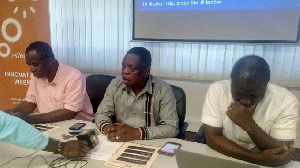 Director-General of the KACE, Kwasi Adu-Gyan
Director-General of the KACE, Kwasi Adu-Gyan
The 2017 innovation week of the Ghana-India Kofi Annan Centre of Excellence (KACE) has been launched in Accra.
The event which is held every year is on the theme: “Exponential technologies and innovations; an enabler in socio-economic development of Ghana," is scheduled for December 5 to 7, 2017.
It is aimed at bringing together key stakeholders to deliberate on emerging ICT issues which have impact on Ghana’s development and the world at large.
This year's edition which was outdoored on November 27, will focus on embracing innovation and efficiency in all sectors of the economy and facilitating growth and success rates for start-up, Small and Medium Scale Enterprises (SMEs).
According to the Director of Consultancy at the Centre, Mr. Ernest Ofori, the innovation week for more than a decade now, has focused solely on individual technologies and technology paradigms that fall in realms such as ; Open Source Software, Mobile Technologies and Apps, Cloud Technologies, Artificial Intelligence, Robotics, 3D Printing, Internet of Things, Drones and other Robotics technologies.
Speaking at the launch, Dr John Effah, a Senior Lecturer at the Department of Operations and Management Information Systems at the University of Ghana Business School, called on the academia to support the initiative by the centre.
The Ghana-India Kofi Annan Centre of Excellence (KACE) has also added Development Research, Innovations and Software Development to its core activity of training people in various fields of Information and Communication Technology (ICT).
This, according to the Director-General of the centre, Mr Kwasi Adu-Gyan will help make software acquisition cheaper for companies, institutions and individuals.
The centre, also known as Advanced Information Technology Institute, was set up by the governments of Ghana and India to bridge the gap between academia and industry by training people to acquire requisite skills to help meet demands of the job market.